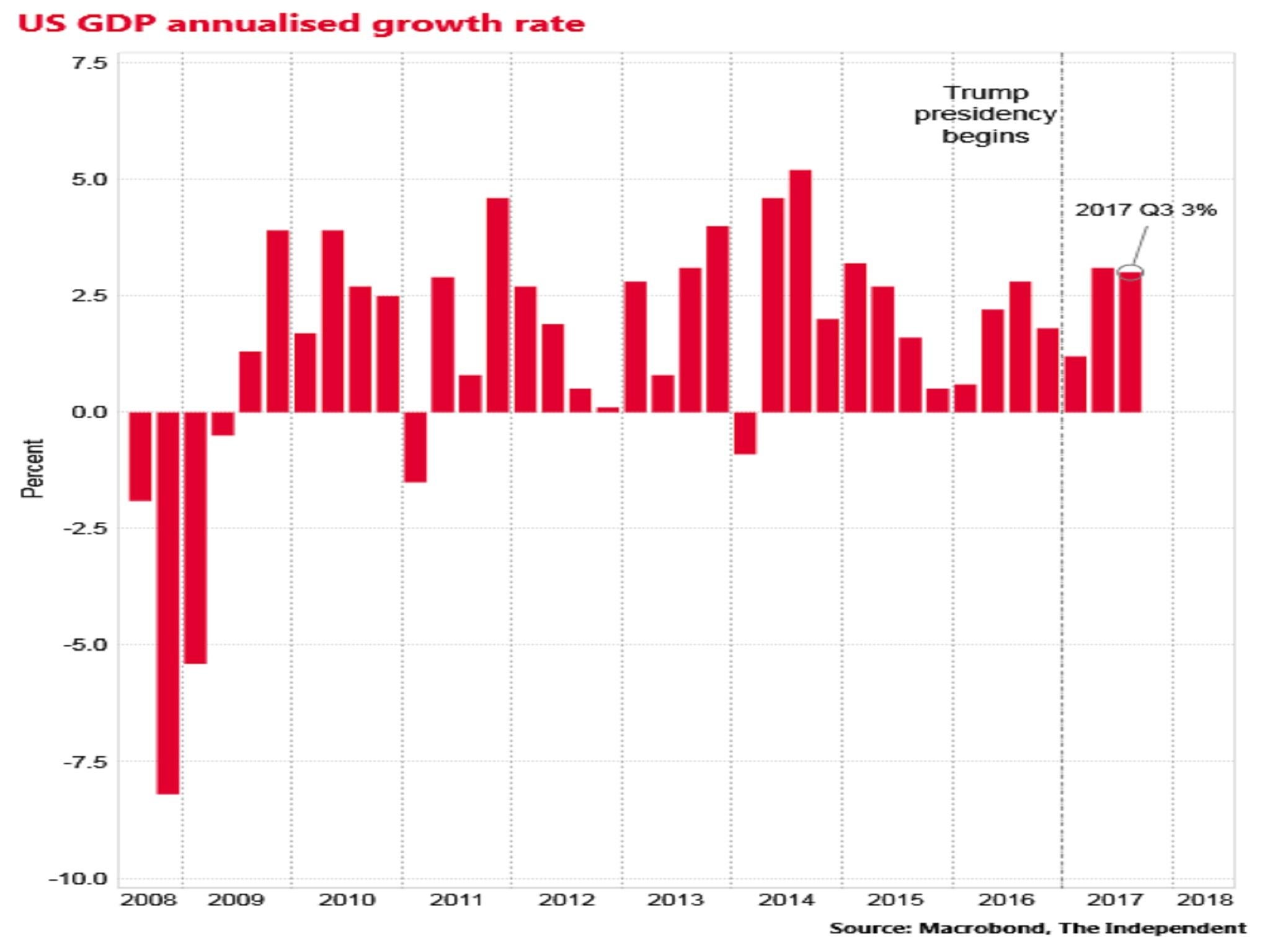What has Donald Trump achieved for the US economy 12 months after winning the Presidency?
How has the US economy actually performed in the Trump era? And how much can he actually legitimately take credit for?

Your support helps us to tell the story
From reproductive rights to climate change to Big Tech, The Independent is on the ground when the story is developing. Whether it's investigating the financials of Elon Musk's pro-Trump PAC or producing our latest documentary, 'The A Word', which shines a light on the American women fighting for reproductive rights, we know how important it is to parse out the facts from the messaging.
At such a critical moment in US history, we need reporters on the ground. Your donation allows us to keep sending journalists to speak to both sides of the story.
The Independent is trusted by Americans across the entire political spectrum. And unlike many other quality news outlets, we choose not to lock Americans out of our reporting and analysis with paywalls. We believe quality journalism should be available to everyone, paid for by those who can afford it.
Your support makes all the difference.Ever since he unexpectedly prevailed over Hillary Clinton in the 8 November 2016 presidential election, Donald Trump has been boasting about his achievements in boosting the US economy.
But how has the US economy actually performed in 12 months of the Trump era?
And how much can he actually legitimately take credit for?
The stock market
Trump’s biggest economic boasts relate to the US stock market.
Last month he even seemed to be claiming that markets had put on so much value since he won the election that he had wiped out much of the American national debt – a claim that makes no conceptual sense.
It’s true that stock market valuations have risen since 8 November 2016.
The S&P 500 index of the leading 500 American companies is up around 22 per cent over that time.
That equates to an increase in value of around $4 trillion.

But the idea that this increase can be entirely attributed to Trump is pretty dubious.
European stock markets are also up strongly since the US election, reflecting a generally stronger global economic outlook.
Job creation
Trump also claims to have boosted US employment through his exhortations for manufacturers to repatriate off-shored jobs to American soil.
But there's not much evidence of that effect in the official figures.
Since he won the vote, the US economy has added an average of 167,000 new jobs each month and the unemployment rate has dipped to just 4.1 per cent.
That's a perfectly respectable job-creation record, although it’s below the average jobs growth of 185,000 since the US emerged from recession in 2010.

Moreover, as with the stock market, it’s doubtful how much credit Trump can claim for this record given he only took office in January and has struggled to implement his economic policy agenda.
Many of the US automobile manufacturing sector jobs and investment announcements over the past year were already in the pipeline before Mr Trump won the election.
GDP growth
On the campaign trail Donald Trump and his team promised to get US growth back up to 4 per cent a year – rates not seen on a sustained basis since the 1990s.
Over the first three quarters of 2013 US GDP has averaged 2.5 per cent – a decent clip but there is no indication of an acceleration to Trump’s target.

Also, given the failure of Trump, so far, to enact any of his flagship economic policies, mainly tax cuts and infrastructure spending, the GDP growth rate this year really represents his inheritance from Barack Obama.
Trade
Trump the presidential candidate railed against the US current account deficit, claiming its vast size represented the extent to which Americans were being ripped off by foreigners through bad trade deals.
He promised that he would put this right by tearing up and renegotiating these deals.
There has been some action. Trump picked a fight with Canada over timber imports.
And the Commerce Department is imposing punitive tariffs against imports of some Bombardier jets, part of which are manufactured in Northern Ireland.
Yet the NAFTA trade deal, which also covers Mexico, has not, so far, been dismantled.
Nor did Trump officially label China a currency manipulator, despite what he loudly promised in the campaign.

The broad US current deficit, which includes the trade deficit, in the second quarter of 2017 actually increased to $123bn (£94bn).
And economists have warned that if Trump succeeds in getting his income tax and corporation tax cuts through the US Congress, the most likely effect will be to increase the current account deficit still further.
Join our commenting forum
Join thought-provoking conversations, follow other Independent readers and see their replies
Comments